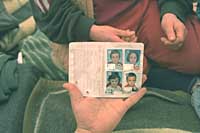 |
 |
|
 |
 |

 In the biggest refugee exodus
in Europe since World War II, UNICEF has joined other humanitarian agencies in providing
emergency assistance
to tens of thousands of people, including many women and children.
The refugee count from Kosovo has reached 523,700:
• 314,300 into Albania;
• 116,500 into Macedonia;
• 65,500 into Montenegro;
• 27,400 into Bosnia.
"If ever a conflict had a human face –– scarred, tortured, but still
human –– it is this one,” said UNICEF Executive Director Carol Bellamy.
“These human beings, transformed overnight into refugees and the internally
displaced, defy the anonymity of numbers."
About half of the more than 500.000 Kosovar refugees who have poured out of the
province in the last three weeks are children under the age of 15. UNICEF is providing
clean water, blankets, essential drugs, and baby care supplies. Emergency medical supplies
have been delivered to treat respiratory illnesses and diarrhea, the world's biggest
children killer. A UNICEF-supported immunization campaign against measles, polio, and
other diseases has been launched. In addition, UNICEF has created mobile health teams
equipped with essential drugs and medical supplies.
|

The Shala family in their tent in a refugee camp near
Tetovo, Macedonia. From left to right: Fikrije (the mother, holding an identification
card), Valmira, 11, Valon, 9, Rexshep (the father), and Gentian, 5. Mr. and Mrs. Shala's
seven- year-old daughter, Gentiana, and an aunt became separated from the family by Serb
soldiers before crossing the border from Kosovo.
© UNICEF/HQ99-0010/Mia Brandt |
The mass movement of families has led to many being split up. UNICEF is working with
the Red Cross to identify families who are in this desperate situation. Six reunification
centers are now operating in Skopje to help children who have been torn apart from their
families. So far, UNICEF has helped reunite 150 unaccompanied children with their loved
ones.
Bellamy said some of the most important, long-term work is in programs to help children
cope with emotional stress through play and educational activities. In Macedonia, tent
schools are being created to serve refugee children and local teachers and counselors are
being trained to cope with the special psycho-social needs of refugee children. In Kukes,
northern Albania, UNICEF is supporting a network of local trauma counselors to
create

This is an identification card for Fikrije and Rexshep
Shala's four children. Their daughter Gentiana is pictured in the lower left corner.
© UNICEF/HQ99-0011/Mia Brandt |
|
a positive environment for young children through the organization of play groups.
"Bringing education and creative play back into children's lives provides them
with a much-needed routine at a time when their lives have been so shattered,"
Bellamy said. "Our hope is to engage them, to help them cope with their distress by
getting them to draw, play soccer, read books and to do, as much as possible, what normal
children do."
Months before NATO launched air strikes targeted against the Government of President
Slobodan Milosevic, fighting between Serbian government forces and the Kosovo Liberation
Army forced tens of thousands of refugees to flee from their homes for the relative safety
of the rugged mountains and dense forests of southern Kosovo. Forced to live in harsh
conditions without shelter or a steady supply of food, the refugees also lack health care,
potable water, hygiene, adequate clothing, and fuel. Dehydration and diarrheal diseases
are becoming increasingly prevalent. Education for a majority of these refugee children is
nearly nonexistent.
"What is happening in Kosovo is beyond words," Bellamy said. "The people
of Kosovo are now subject to the worst violations of body and soul that can be
described.”
Please join the U.S. Committee for UNICEF in helping to provide urgently needed
assistance.
|
 Document compiled by Dr S D Stein
Document compiled by Dr S D Stein